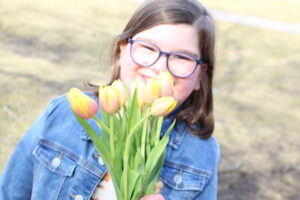 By all appearances, 10-year-old Vera Johnson of Minnesota seems very much like her peers. She lives life largely outdoors and especially loves winter, when she can ice skate, sled, and even occasionally cross-country ski. In the summer, she spends days swimming at a Lake Superior beach.
By all appearances, 10-year-old Vera Johnson of Minnesota seems very much like her peers. She lives life largely outdoors and especially loves winter, when she can ice skate, sled, and even occasionally cross-country ski. In the summer, she spends days swimming at a Lake Superior beach.
What the world doesn’t see is the life filled with hospital visits, therapy, surgeries, and feeding tubes that got Vera to this point today.
“From the outside, she looks like a super healthy kid,” said Vera’s dad, Mychal. “But that’s not the case. Vera often has to ride in a stroller because of her fatigue. A lot of people don’t understand why.”
This is life for the thousands of patients who, like Vera, are living with mitochondrial disease.
Life for Vera has never been quite normal. Just a few days into the world, she would require heart surgery for survival. Despite a successful operation, her lactate levels were extremely high. Doctors recognized it as a sign of potential mitochondrial disease – a suspicion that was confirmed by specialists at the Mayo Clinic near the Johnsons’ hometown in Rochester, Minnesota.
As a newborn, Vera would spend three months in the hospital. Simply to make it home required the insertion of a feeding tube.
 Her diagnosis would kickstart a whirlwind of doctors, specialists, and tests that the family is still living in today. “At the time of the diagnosis, the doctors said she was only the fifth patient worldwide with this variant,” said Vera’s mom, Rebecca.
Her diagnosis would kickstart a whirlwind of doctors, specialists, and tests that the family is still living in today. “At the time of the diagnosis, the doctors said she was only the fifth patient worldwide with this variant,” said Vera’s mom, Rebecca.
Emergency room visits and interventions became the norm in Vera’s early years. Like many mitochondrial disease patients, Vera would seemingly stabilize, only to have minor illnesses set her back. The family became regulars at the Mayo Clinic.
Rebecca credits one of the Mayo Clinic’s mito specialists, Dr. Deborah Renaud, with helping the family in multiple ways. She not only played a key role in stabilizing Vera, but she also introduced the family to the United Mitochondrial Disease Foundation (UMDF).
“She was a real ‘mama bear’,” said Rebecca. “We were very sad when she retired.”
Rebecca and Mychal turned to UMDF for support, attending virtual meetings and webinars like Ask the Mito Doc, a monthly series allowing families to ask questions of some of the world’s preeminent mitochondrial disease specialists.
In 2016, the family attended their first UMDF Energy for Life event, a walkathon in Minneapolis. “It was a turning point for us,” said Rebecca. “We raised some money, but we also made so many connections from that initial event – people we still talk to today.”
 The family was soon faced with decisions about school, a process fraught with danger for immunocompromised patients like Vera. After a failed attempt at preschool where Vera missed more days than she attended, doctors recommended holding her out of school until she was older and stronger.
The family was soon faced with decisions about school, a process fraught with danger for immunocompromised patients like Vera. After a failed attempt at preschool where Vera missed more days than she attended, doctors recommended holding her out of school until she was older and stronger.
“We really wanted to get to the point where Vera could figure out her body and tell us before it gets to an emergency,” said Rebecca.
Before that could happen, COVID-19 hit, making the family’s already small world even smaller. “We already lived a really quiet life, even before COVID,” said Rebecca. “We were already doing health checks. Our world just became that much smaller.”
Rather than risk Vera’s health, the family chose to homeschool, which they maintained for several years, with Rebecca acting as both mother and teacher. “Vera works very hard at homeschool,” she said. “Because of her disease, she sometimes has memory issues, so we really have to ensure we keep at it.”
Slowly, as the pandemic grew to be less of a risk, Vera began attending school part-time for social groups and adaptive learning. This year, as a 10-year-old, she attends school daily in shortened timeframes, approximately 90-minute segments, with her days backfilled by homeschooling and occupational and speech therapies.
Vera has blossomed amongst her peers. “She loves seeing teachers and seeing friends,” said Rebecca. “She is about a grade level behind, but she is eager to learn. She loves math and is especially good at reading.”

While the family appreciates Vera’s growth and stability today, they don’t take it for granted.
“We’re not going to sit and dwell on the negative. Watching the things she can do gives us hope. But, we also take one day at a time and try to follow Vera’s lead,” said Mychal.
“We have so many hopes,” added Rebecca. “That her skills continue to progress. That her disease doesn’t progress. And yes, we hope for a cure. We believe it’s possible.”
We at UMDF are helping to make the Johnson family’s hope a reality by charting out the course for mitochondrial treatments and eventual cures. And we’re closer than ever.
But we need your help. Your financial gift today could very well fund the research that unlocks tomorrow’s treatments and cures.
On behalf of Vera and the thousands of other patients living with mitochondrial disease in the U.S., we thank you for helping us fuel the fight.
